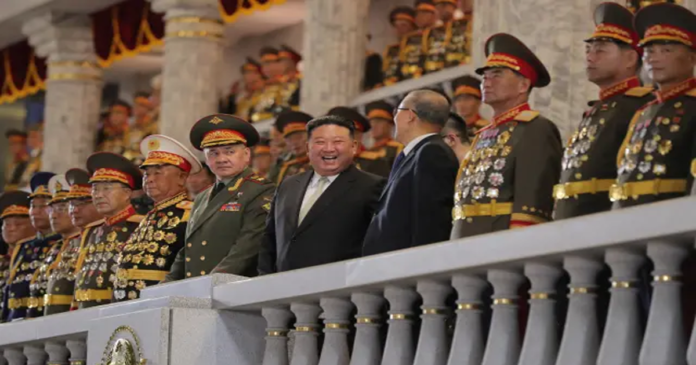North Korea’s state media on Friday released a footage of Chinese and Russian officials stood shoulder to shoulder with Kim Jong Un as they inspected the latest nuclear-capable missiles and attack drones at a military parade in Pyongyang.
Russian Chinese join Kim Jong at military parade: On Thursday evening, the capital’s much-anticipated parade honoured the 70th anniversary of the conclusion of the Korean War, known in North Korea as “Victory Day.”
Since the dissolution of the Soviet Union in 1991, Sergei Shoigu, the defence minister of Russia, has not visited the country. The mission from China was the nation’s first of its kind since the COVID-19 outbreak started.
In contrast to previous years, when Beijing and Moscow sought to distance themselves from their neighbor’s nuclear weapons and ballistic missile development, their attendance at events with the North’s nuclear missiles—banned by the United Nations Security Council with Chinese and Russian support—marked a significant change.
Photos issued by North Korean official media showed Kim, Shoigu, and Chinese Communist Party Politburo member Li Hongzhong conversing, laughing, and saluting while North Korean soldiers marched and weaponry tumbled beneath them.
According to KCNA, the parade featured North Korea’s most recent intercontinental ballistic missiles, the Hwasong-17 and Hwasong-18, which are said to have the range to reach targets anywhere in the United States.
According to KCNA, the ceremony included a flypast by brand-new assault and spy drones.
In a luncheon and reception he arranged for Shoigu, Kim pledged his support for the Russian people and its armed forces. According to KCNA, Shoigu described the North Korean military as the best in the world and the two men talked on defence and strategic security cooperation.
State media stated that during a separate meeting, Shoigu read a statement of congratulations from Russian President Vladimir Putin in which he thanked North Korea for its assistance during the “special military operation” in Ukraine.
“US Accuses Pyongyang of Supplying Weapons to Russia”
Washington has charged Pyongyang of giving Russia weaponry for its conflict in Ukraine. Vedant Patel, a deputy spokesperson for the State Department, stated on Thursday that the United States was “incredibly concerned” about relations between Moscow and Pyongyang.
Both Moscow and Pyongyang have denied transacting in weaponry.
Ankit Panda of the American-based Carnegie Endowment for International Peace said that the new surveillance drones may be used to inspect targets in real time, carry out damage assessments in a fight, and generally improve strategic situational awareness.
Five North Korean drones entered the South in December, causing Seoul’s military to scramble fighter jets and helicopters and step up anti-drone precautions at strategic locations including the presidential office.
Given their susceptibility to anti-aircraft defences, the new attack drones would be of little utility in a battle on the Korean Peninsula, but “North Korea may seek to offer these drones to external customers,” Panda said.
According to images from the official media, the drones were among the armaments on exhibit at an arms fair that Kim and Shoigu visited this week in Pyongyang.
Defence Minister General Kang Sun Nam made the charge against the US and its allies during his remarks during the parade.
Since 2006, North Korea has been subject to U.N. sanctions because of its missile and nuclear programmes. It also prohibits the creation of ballistic missiles.
“Russia and China Reject US-Led Sanctions on North Korea, Raising Concerns Over Commitment to Enforcing Penalties”
Recently, Russia and China rejected U.S.-led efforts to impose additional sanctions on North Korea over its persistent pursuit of ballistic missiles. They asserted the need to relax current restrictions for humanitarian reasons and to encourage Pyongyang to engage in negotiations.
According to Leif-Eric Easley, professor of international studies at Ewha Womans University in Seoul, the Chinese and Russian participation in events with prohibited ballistic missiles raises questions about those nations’ commitment to enact penalties.
When two permanent U.N. Security Council members publicly back a North Korean state that violates human rights and disobeys resolutions prohibiting its nuclear and missile development, Easley said, “it doesn’t help.”
“All members of the Security Council and, frankly, all member states of the U.N. share the same responsibility to uphold Security Council resolutions,” U.N. spokesperson Stephane Dujarric said.

